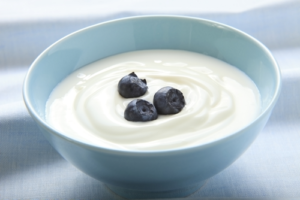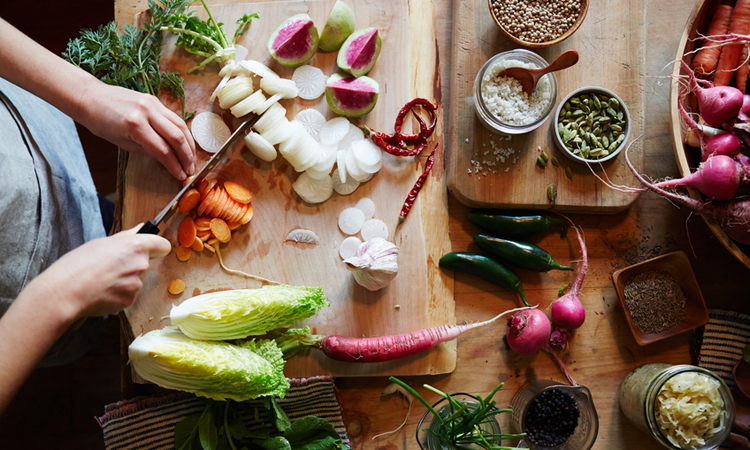Who among us hasn’t been to a fermentation festival? Well, actually I haven’t. But that has not been any impediment in the rise of a flourishing and enthusiastic trend of experimenting with fermentation, to enhance flavors and create healthier and more sustainable foods. Of course, fermentation is by no means a recent technique. It is ancient, and there is evidence from the Neolithic period that suggests that there was intentional fermentation of fruit, rice or honey beverages for at least 10,000 years. It is probable that alcohol fermentation was one of the first chemical reactions observed by humans, and when they realized that a good time could be had by all, no party has been complete without it.
Fermentation is the flip side of the spoilage of food, as a result of bacterial action. Early in history, humans discovered that for certain foods, enzymatic changes could result in products that were enjoyable to consume. It can be presumed that our ancestors used fermentation of food and beverages for preservation, enhanced nutritional value and to improve flavors. Although we are not specifically concerned with food preservation in an era of refrigeration and chemical preservatives, our renewed ardor for this old technique is now all about exotic flavors and nutrition.
 Fermentation is a lively process. It represents the chemical transformation of organic substances into simpler compounds by the action of enzymes and complex organic catalysts. The real action comes from living collaborators – molds, yeasts and bacteria. Fermentation is typically accomplished by microorganisms, through processes that convert sugars into alcohol. This process takes an enormous number of microbial participants. It is calculated that it takes over 35 billion yeast cells to begin to make one gallon of beer. It is their metabolic action that produces beneficial effects for us. The by-products of those metabolic processes improve the absorption of some B-vitamins and the bioavailability of certain minerals, such as zinc and magnesium. It may also be that the microbes themselves are also responsible for some of the derived health benefits, by significantly affecting the composition of our gut microbiome.
Fermentation is a lively process. It represents the chemical transformation of organic substances into simpler compounds by the action of enzymes and complex organic catalysts. The real action comes from living collaborators – molds, yeasts and bacteria. Fermentation is typically accomplished by microorganisms, through processes that convert sugars into alcohol. This process takes an enormous number of microbial participants. It is calculated that it takes over 35 billion yeast cells to begin to make one gallon of beer. It is their metabolic action that produces beneficial effects for us. The by-products of those metabolic processes improve the absorption of some B-vitamins and the bioavailability of certain minerals, such as zinc and magnesium. It may also be that the microbes themselves are also responsible for some of the derived health benefits, by significantly affecting the composition of our gut microbiome.
The human microbiome is the combination of microbes and their genetic complement that are essential parts of many of our body tissues. Although we may regard ourselves as singular organisms, we are decidedly not. In many respects, we are substantially microbial. There are 100 trillion or more microbes living in us and on us. They outnumber our own natural cells by more than ten to one. The amount of genetic material in those microbes overwhelms our own genetic composition by more than 100 to one. These are not just hangers-on. They perform vital functions by modulating our immune systems, growth and development, metabolism and even affect our moods.
Fermented foods include pickles, yogurt, cheese, beer, wine miso (fermented soybeans), sauerkraut, kimchi (fermented cabbage), kefir (a fermented milk drink) and kombucha (fermented tea). Many of these products have been linked to relief of symptoms of irritable bowel syndrome and inflammatory bowel disease. They have also been associated with improved function of the immune system, enhanced absorption of various nutrients and decrease serum cholesterol levels. Further yet, a number of studies have indicated that the ingestion of fermented milk products and yogurt are associated with decreased incidence of heart disease, dental decay and some forms of cancer, such as bladder cancer.
 In the last decade, a number of studies have emphasized that consumption of fermented foods may be associated with lower rates of social anxiety in young adults. It is now known that there is a rich interrelationship between cognitive function and gut health through robust pathways that have been recently identified. This co-dependency is now termed the “gut-brain axis,” and works through the transport of neurotransmitters produced by bacteria that circulate to the brain.
In the last decade, a number of studies have emphasized that consumption of fermented foods may be associated with lower rates of social anxiety in young adults. It is now known that there is a rich interrelationship between cognitive function and gut health through robust pathways that have been recently identified. This co-dependency is now termed the “gut-brain axis,” and works through the transport of neurotransmitters produced by bacteria that circulate to the brain.
Recent placebo-controlled human studies have demonstrated that the administration of oral probiotic microbes can reduce anxiety by diminishing perceived stress and depression. One such study involved a specialized scanning technique, functional magnetic resonance imaging, to study brain function. This demonstrated that the consumption of fermented foods for a one month period – containing some specific bacterial strains – can objectively influence brain activity, specifically those areas that control central processing of emotion and sensation.
At the moment, it isn’t clear exactly how ingested microbes are beneficial to the gut microbiome, and then ourselves. One theory is that they compete with bacterial pathogens, actively protecting us against other interfering bacterial strains. Probiotics may also act by strengthening the gut mucosal barrier or promoting the release of anti-inflammatory molecules that mediate the immune system.
 Nor is there any clarity as to what portions of differing probiotics are necessary to obtain a health benefit. One study has suggested that you need between 100 million to two billion microbes per serving. Although exact amounts aren’t known, that requirement is probably satisfied by a single serving of yogurt or typical portions of other fermented foods.
Nor is there any clarity as to what portions of differing probiotics are necessary to obtain a health benefit. One study has suggested that you need between 100 million to two billion microbes per serving. Although exact amounts aren’t known, that requirement is probably satisfied by a single serving of yogurt or typical portions of other fermented foods.
One thing is unequivocal, despite any other uncertainties. We have only just now begun a long exploration of our understanding of the microbiome, the foods that might affect it, or our health in relation to manipulating it.
So go ahead, have what you like. Who says yogurt, a pickle and a glass of beer don’t make a fine dinner?



